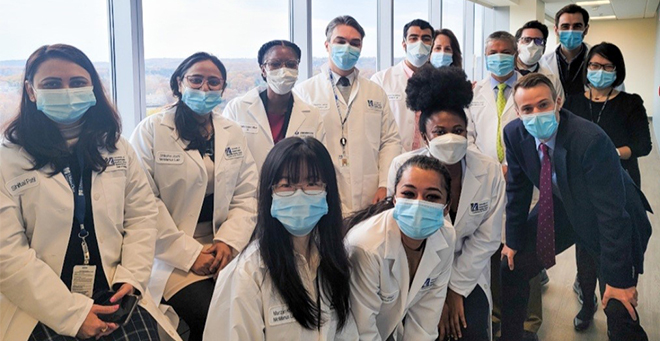A lab at UMass Chan Medical School is seeking applicants for a new program established to increase diversity in the health sciences.
David McManus, MD, the Richard M. Haidack Professor of Medicine, chair and professor of medicine, and Edith Mensah Otabil, clinical research coordinator in the McManus lab, have created a program called Pipeline for Underrepresented Students in Medicine, or PRISM.

PRISM will expose undergraduate and postgraduate students from diverse backgrounds who are traditionally underrepresented in medicine to clinical research methods. Mentorship is central to the paid, noncredit clinical research opportunity in the Department of Medicine, open to students and alumni of schools that are a part of the Higher Education Consortium of Central Massachusetts. Two students will be accepted into the program this year.
“This program is very important because people of color, or people who are underrepresented in medicine, encounter several systemic and historical barriers in pursuit of their aspirations,” Mensah Otabil said. “They might not have the right mentorship, or people to look up to who can inspire them to reach for the stars in whatever STEM field they desire. This is why a program like PRISM exists to address these issues.”
Mensah Otabil knows what this kind of opportunity can mean for an aspiring researcher or doctor. The summer before her senior year at the College of the Holy Cross, she learned about a lab opportunity with Dr. McManus from a former tutor.
“Dr. McManus and I talked about paying it forward since someone helped me get into this position,” Mensah Otabil said. “So what could I do to also extend that grace to others? Being a person of color in STEM and realizing the underrepresentation in both medicine and STEM in general, I wanted to help create a pipeline program to address this issue and increase diversity in this field.”
“We believe this program is important for several reasons, not the least of which is the fact that we want to build a clinical research group in medicine that is rich, healthy, diverse and representative of our community. This will lead to better science,” McManus said. “It provides opportunities for many folks interested in clinical careers to be embedded in clinical environments with great mentors.”
The McManus lab primarily focuses on research related to COVID-19 rapid diagnostic devices, cardiovascular diseases and digital health medicine. Among the studies Mensah Otabil helps coordinate is Pulsewatch, which is investigating the efficacy of a smartphone/smartwatch system in detecting atrial fibrillation in stroke survivors when compared to an FDA heart patch.
“There’s so many studies that are going on in the lab,” Mensah Otabil said. “Depending on their interest, candidates selected for the PRISM program can choose from a myriad of McManus lab studies they would like to pursue during their time here.”
The deadline to apply for this program is March 15. Those who are interested can submit an application through the UMass Chan website.
Related UMass Chan News stories:
David McManus and Brian Lewis named to endowed chairs
Digital medicine expert David McManus appointed to serve as chair of medicine